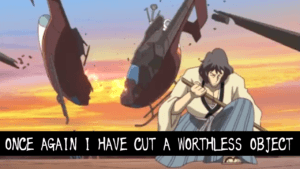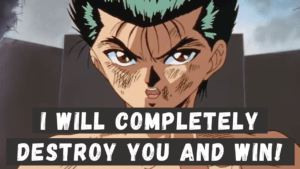Let’s learn Japanese with Anzai-sensei’s quote from Slam Dunk.
CONTENTS
Video
Anzai-sensei’s Quote
Japanese: 諦めたらそこで試合終了だよ。
Romaji: akirametara soko de shiai shuuryou da yo.
English: When you give up, that’s when the game is over.
Analysis
諦めた is the ta-form of 諦める meaning “give up”. Ta-form of a verb followed by ら means “if”, “when”, or “after” depending on the context. So, 諦めたら means “when you give up”.
そこで means “at that point” in time. It’s used in response to the statement mentioned before or the situation that happened before.
試合 means “a game” or “a match”.
終了 means “an end”. It’s the same meaning as 終わり but 終了 is more technical and official than 終わり and 試合終了 is often used as a word meaning “the end of the match”.
だよ is combined with だ attached to a noun or na-adjective and the sentence ending particle よ used to make the listener aware of the information.
Examples
たら (if, when or after)
犬を飼ったら庭に犬小屋を作ろう。
inu o kattara niwa ni inugoya o tsukurō.
If we get a dog, let’s build a dog house in the garden.
大人になったらわかるよ。
otona ni nattara wakaru yo.
When you grow up, you will understand.
大学を卒業したらどうするの?
daigaku o sotsugyō shitara dōsuru no?
After you graduate from university, what are you going to do?
You can add もし in the beginning of the sentence to make it specifically mean “if”.
もし宝くじが当たったら家を買う。
moshi takarakuji ga atattara ie o kau.
If I won the lottery, I would buy a house.
そこで (“at that point” in time)
あと20分勉強したら、そこで一旦休憩しよう。
ato nijuppun benkyō shitara soko de ittan kyūkei shiyō.
After studying for another 20 minutes, let’s take a short break then.
雨が降り始めたので、試合はそこで中止になった。
ame ga furihajimeta node, shiai wa soko de chūshi ni natta.
Because it started to rain, the game was called off there.
Your friend started to laugh when you were talking about something serious, so you say:
ちょっと、そこで笑う?
chotto, soko de warau?
Hey, is that where you laugh?
Support Easy Peasy Japanesey
If you enjoy our content, please consider supporting Easy Peasy Japanesey. Your support will help keep us going. Thank you for your support!


